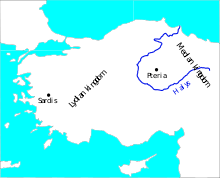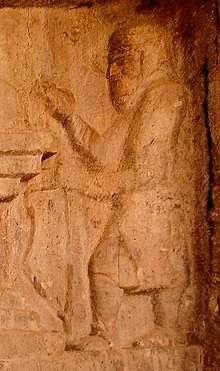Battle of the Eclipse
The Battle of the Eclipse[1] or Battle of Halys[2] was fought between the Medes and the Lydians in the early 6th century BC. The result was a draw which led to both parties negotiating a peace treaty and ending a six-year war. According to Herodotus, the appearance of a solar eclipse at the time of battle was interpreted as an omen, and interrupted the battle.
| Battle of the Eclipse | |||||||
|---|---|---|---|---|---|---|---|
| Part of Lydo-Median war | |||||||
 Halys River in the border regions of the Lydian and Median kingdoms in the early 6th century BC | |||||||
| |||||||
| Belligerents | |||||||
| Lydia | Media | ||||||
| Commanders and leaders | |||||||
| Alyattes | Cyaxares or Astyages | ||||||
Herodotus writes that in the sixth year of the war, the Lydians under King Alyattes and the Medes under Cyaxares were engaged in an indecisive battle when suddenly day turned into night, leading to both parties halting the fighting and negotiating a peace agreement. Herodotus also mentions that the loss of daylight had been predicted by Thales of Miletus. He does not, however, mention the location of the battle.[3]
Afterwards, on the refusal of Alyattes to give up his suppliants when Cyaxares sent to demand them of him, war broke out between the Lydians and the Medes, and continued for five years, with various success. In the course of it the Medes gained many victories over the Lydians, and the Lydians also gained many victories over the Medes. Among their other battles there was one night engagement. As, however, the balance had not inclined in favour of either nation, another combat took place in the sixth year, in the course of which, just as the battle was growing warm, day was on a sudden changed into night. This event had been foretold by Thales, the Milesian, who forewarned the Ionians of it, fixing for it the very year in which it actually took place. The Medes and Lydians, when they observed the change, ceased fighting, and were alike anxious to have terms of peace agreed on.[4]
As part of the terms of the peace agreement, Alyattes's daughter Aryenis was married to Cyaxares's son Astyages, and the Halys River (now known as the Kızılırmak River) was declared to be the border of the two warring nations.
Cicero mentions that Thales was the first man to successfully predict a solar eclipse during the reign of Astyages.[6] He was the son and successor of Cyaxares and his reign began at the end of the war after Cyaxares' death.
Pliny the Elder mentions as well that Thales had predicted a solar eclipse during the reign of Alyattes.[7]
If one reads the description by Herodotus of the event as a solar eclipse, then based on modern astronomical calculations it can be identified with the solar eclipse of May 28, 585 BC (the Eclipse of Thales), hence yielding the exact date of the battle. For the location of the battle, some scholars assume the Halys River (today Kızılırmak River) as it was located in the border region between both kingdoms.[1] As Isaac Asimov noted, this would be the earliest recorded eclipse the date of which was accurately determined in advance of its occurrence.[8]
However, such a reading is for a variety of reasons rather problematic and hence disputed by various scholars. For example, the known astronomical knowledge available of that time was not sufficient for Thales to predict the eclipse.[9] Also, the eclipse would have occurred shortly before sunset at any plausible site of the battle, and it was very uncommon for battles to take place at that time of day. Furthermore, based on the list of Medean kings and their regnal lengths reported elsewhere by Herodotus, Cyaxares died 10 years before the eclipse.[10][11]
References
- Kevin Leloux: The Battle of the Eclipse (May 28, 585 BC): A Discussion of the Lydo-Median Treaty and the Halys Border. In: Polemos. Volume 19, no. 2, 2016, ISSN 1331-5595, pp. 31–54, in particular 37–39, 49 (online)
- Tony Jacques: Dictionary of Battles And Sieges: A Guide to 8,500 Battles from Antiquity Through the Twenty-first Century. F-O Greenwood Publishing Group 2007, ISBN 0-313-33536-2, p. 428 (Auszug, p. 428, at Google Books)
- Herodotus: Histories 1,74,2 (online)
- The Histories. Herodotus.
- Gershevitch, I.; Fisher, William Bayne; Avery, Peter; Boyle, John Andrew; Frye, Richard Nelson; Yarshater, Ehsan; Jackson, Peter; Melville, Charles Peter; Lockhart, Laurence; Hambly, Gavin (1985). The Cambridge History of Iran. Cambridge University Press. p. 139. ISBN 9780521200912.
- Cicero: De divinatione 1,49 (online)
- Pliny the Elder: Naturalis historia 2,9 (53) (online)
- "Happy Birthday to Science", by Tom Mandel, at the Chicago Sun-Times (archived at HighBeam Research); published May 28, 1990; retrieved April 11, 2014
- Querejeta, M. (2011). "On the Eclipse of Thales, Cycles and Probabilities". Culture and Cosmos. 15: 5–. arXiv:1307.2095. Bibcode:2013arXiv1307.2095Q.
- Alden A. Mosshammer: Thales' Eclipse. Transactions of the American Philological Association, Vol. 111, 1981, pp. 145–155 (JSTOR)
- Otta Wenskus (2016). "Die angebliche Vorhersage einer Sonnenfinsternis durch Thales von Milet. Warum sich diese Legende so hartnäckig hält und warum es wichtig ist, ihr nicht zu glauben" (PDF) (in German). pp. 2–17.
